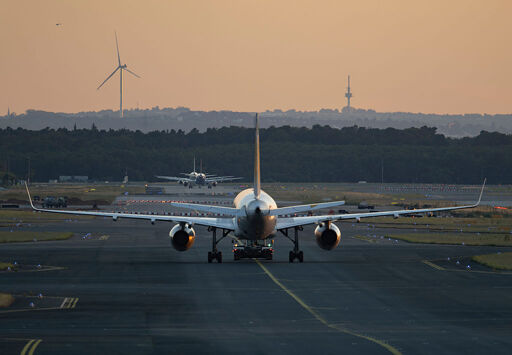It is absolutely not OK that there still is a tax exemption on any flight whatsoever.
That and the shameless dynamic pricing of trains.
No tax on airline fuel.
Flying receives far lower subsidies and infrastructure spending than rail. The EU subsidises air travel (including said avgas tax exemption) to the tune of around €30–40 billion annually depending on what you include and what you consider to be a “subsidy.” Using similar criteria, rail is subsidised to the tune of €40–75 billion per year. So rail gets a lot more investment despite it serving 16% fewer travel kilometers per year in the EU than air travel.
“16% fewer travel kilometers”, meaning trains are used massively more often since they typically don’t cover nearly as many kilometers. People would probably chose to take the train more often even if it meant traveling to less distant destinations if the planes were more expensive.
You’ve convinced me: rail should be subsidised more and air travel should get nothing (unless there is no equivalent train route e.g. across the sea) .
Conservatives sure like to stick up for the worst polluters. You could just tax the fuel like any other industry.
That’s really unfortunate.
I’m just here to applaud the mods… (See the deleted comments/spam)
Oh god this looks like a massacre
Removed by mod
They’re late because the train is delayed
I wish it were easier to find actions on specific posts in some instances. Piefed even harder to use from my experience so far.
What happened?
Wow, that’s crazy. I just saw the same thing at the news channel.
Hell, it’s cheaper and faster to fly from Zurich or Munich to Hamburg via Barcelona, London or Dublin.
But why though?
Air travel is heavily subsidised, especially through very very very favourable tax rates on aviation fuel
Rail is very expensive to build, operate, and maintain. Rail is far more heavily subsidised in Europe than air travel and it’s still more expensive. It also doesn’t respond well to changes in demand. Tracks can’t be easily moved. Flights can easily be redirected. As technology and efficiency improves, flights become cheaper every year. Not rail, however, because most of the cost of operation and maintenance has nothing to do with energy efficiency. This gap will continue to widen. Further, rail has an inherent logistical limitation: all cars share limited lines. They are all limited by the slowest car. They are all stopped when an issue occurs with another car (or tracks). Planes can fly around damage to the network.
Direct flights between airports that don’t serve as hubs for any airline are generally focused on business travel. If you fly via some airlines hub airport you can get cheaper tickets as the flights are more focused on stuffing as many people into a plane as possible.
I’m not sure it’s like this everywhere, but many airlines are more focused on financial products (like credit cards) for profit than flights. Here’s something about it, no guarantee of quality, but it’s enough to get the general idea: https://www.theatlantic.com/ideas/archive/2023/09/airlines-banks-mileage-programs/675374/
Cheaper maybe, but I don’t bet on faster for the passenger. Train station normally are in the city center (or really near), airport are relatively far from the city.
Those price discrepancies are genuinely shocking
You need a study to find out that? Lol
It’a apples to oranges. Pricing policies are different. Only few get the cheapest airline tickets.
There is also a hidden cost from the tracks.
A rail track of 3m for 100km used for solar cells would generate enough electricity to transport 37500 passengers per plane.
Solar cells generate 2kWp per 10 square meters, which are 2MWh per year which is 5kWh per day.
300ksqm generate 150MWh per day.
4l kerosine per pessenger per 100km are about 40kWh.
150MWh are enough for 37500 passengers.
It’s not renewable but influences the economics.
That’s the most idiotic calculation I’ve ever read since I came across the brain melting insanity of solar roadways
Could you explain why, please?
How many electrical planes have you seen?
Four. The only one I’ve seen with more than one seat had an endurance aloft of 50 minutes at 100 knots indicated.
How is that relevant? The article was an economic comparison, not an ecological one.
For an ecological comparison half the numbers. Synthetic fuels are only twice as expensive as fossil jet fuel which should mostly be caused by the needed energy.
By 2019, fossil jet fuel production cost was $0.3-0.6 per L given a $50–100 crude oil barrel, while aviation biofuel production cost was $0.7-1.6, needing a $110–260 crude oil barrel to break-even.
I’m not really sure what point you’re trying to make here -
It’s not like rails are in any significant way displacing solar panels.
If one were motivated, you could use the same land for tracks and for solar panels by raising the solar panels above the tracks and catenaries, making double use of the land at the expense of having to build platforms for the panels.
Finally, solar energy can’t be used to transport passengers by plane since electric plane travel is not at a mass-market scale (nor is it even certain that they will ever be able to).
The costs of the platforms would significantly reduce the efficiency of the solar cells.
My point is that planes have the advantage of not needing tracks which come with costs. There are the maintenance costs and the costs of not using them otherwise. We shouldn’t be surprised if trains can’t compete on many connections.
how high are the maintenance costs compared to airports?
The equivalent would be railway stations. In both cases the minimum is not much more than a roof.
have you ever been to an airport that’s just a roof?
The amortized savings of having the tracks outweigh any opportunity costs introduced by the tracks taking up space.
Do you have any numbers?
In France, airfrance stopped to fly some routes since they cannot make them cheaper than a TGV
Of course there are connections where trains are more efficient. It’s just not all of them. An analysis should try to identify which connections should be cheaper but are not. Listing them all destroys any meaningful critique.
Well, airports are not free
Neither are railway stations.
rail track is one of the worst places you can put solar panels. pressure differentials, oil spills, hot metal, and you can’t angle them which means they can never produce their peak efficiency.
there is no reason to even consider ground-level solar until every rooftop and awning is covered.
what are you trying to say?
The idea is to put them there instead of tracks and let people fly instead. The numbers suggest that that would be a net benefit.
but is that taking into calculation that avgas is not taxed while electricity is? is it taking into account the relative efficiency numbers of turbofans? is it taking into account the cumulative amount of time lost sitting at airports, which is usually not counted into travel time?
There are reasons to go by train. My point is that trains are not naturally more efficient. It takes cheap electricity and high volumes of passengers to make it profitable. Of course fair taxes help but prices weren’t part of my calculation. The energy used for tracks is already so big that many lines are better served by plane.
Can’t wait to send 400000 tons of pig iron by a plane. You are missing the cargo trains (that mostly use the same tracks and are rail company’s bread and butter) in your calculations.
The comparison should use highspeed trains which have their own tracks.
“the energy used for tracks”?
You have to build and maintain them. That costs energy which is driving costs.
compared to airline infrastructure though?
2 kWp means 2 kilo watt peak. It’s the maximum they can produce and in no way the average.
You are right, I considered that.
The average per year is calculated from that number by roughly multiplying with 10 in Europe. I have looked that up and not multiplied by hours in a year.
is that for angled or horizontal?
I don’t know. I just picked the first number I got.
right, so that’s most likely optimal placement, with peak efficiency being reached for a little while each day as long as the weather is good. if they lie flat, you can lose as much as 90% of that energy, and that’s still with proper maintenance. flat panels also don’t self-clean, so maintenance would be even higher.
basically, you can probably skip the multiplication altogether.
It’s not the most optimal. It’s for a 20% panel slightly south of England:
However, in Michigan, which receives only 1400 kWh/m2/year,[3] annual energy yield drops to 280 kWh for the same panel. At more northerly European latitudes, yields are significantly lower: 175 kWh annual energy yield in southern England under the same conditions
okay, so revise the numbers.
*shocked pickachu
How do you need a study for that?!
See, studies are not there to show something is true. They are there to have a scientifically proven analysis as a base.
It’s like when you are at work and everyone knows that meeting xy is inefficient. However, your boss still needs data and a slide deck to present hard facts to the management board.
I understand why you write this, but collecting data is the first step when you want to change something.
Even if a femomenon sounds obvious, maybe it is not. Moreover the study analyses also why this happens, and it is pretty interesting.
Which is cheaper:
- lift 50 tons of metal off the ground burning 20,000 liters of fuel
- make 50 tons of metal run over the ground using electricity
How is this obvious?
If you ever traveled in Europe, you just know
In order to find out the intricacies of WHY, yes.
For cross border routes only 45.9% were always cheaper by plane and for domestic ones only 15.2%.












